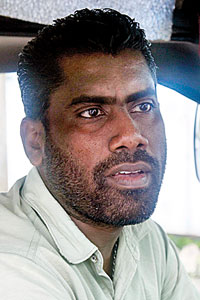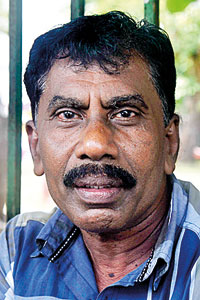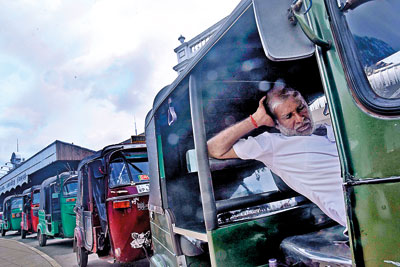News
Some one million three wheelers at sixes and sevens over fares
View(s):- Govt. trying to regulate services but the amendments sitting on Legal Draftsman’s desk, Minister says
By Yoshitha Perera
Three wheeler fares are fluctuating, while amendments to the National Transport Act pertaining to three wheeler regulations have been sitting in the Legal Draftsman Department for months.

Upul Nishantha
Over the last decade rapid growth of the informal transport sector in Sri Lanka has highlighted the need for the implementation of a regulatory framework to create a safety net for passengers’ and service providers’ rights, and for those of society as a whole.
The Government is trying to go forward with plans to regulate three wheeler passenger transport services under the National Transport Commission (NTC), as passengers have complained they are being forced to pay unfair or excessive rates.
However, the Government was unable to change three wheeler fares or create related standards until the National Transport Act was amended, according to Transport Minister Bandula Gunawardana.
“The draft has been sent to the Legal Draftsman’s Department, and it is taking some time to implement the regulations in terms of the amended act,” he said.
There were socioeconomic and operational characteristics of three wheeler fares, regulatory requirements were considered, and a way for developing a fare index for three wheeler transport services with the goal of implementing a regulatory framework was devised, Minister Gunawardana said.
There are now more than one million three wheelers in operation, a figure that is growing on a daily basis due to the attractiveness of the income generated and the low prevalence of entry barriers to the industry.
However, the three wheeler drivers were under immense pressure due to the ongoing fuel crisis, and they were dissatisfied with the weekly fuel quota allocated to them, claiming that it was insufficient, particularly for those whose sole source of income was hires.
Due to the limited allocation of weekly fuel and passenger fares, professional three wheeler driver Ajith Kumara Basnayake, who operates daily from Seeduwa to Colombo, said he was under a lot of pressure.

Ajith Kumara
“We cannot increase the three wheeler fare for passengers. We are still getting Rs. 100 for the first kilometre. Actually, with the fuel quota, and to meet our daily requirements, we need to raise the fare to Rs. 150 a kilometre. But how can we do that. We will not get hires,” he said.
Mount Lavina three wheeler driver Upul Nishantha said he had been in the industry for more than eighteen years and with the current fare it was difficult for him to run on hires.
“A three wheeler tyre that previously cost Rs. 1750 now costs Rs. 5000. The price of the bottle of oil has risen from Rs. 950 to Rs. 2500. At this rate, maintaining a three wheeler is difficult. With the current situation, we need to earn at least Rs. 5000 a day. However, it is difficult for us to earn even Rs. 1000 a day,” he said.
Even though the Government recently reduced petrol prices, three wheeler drivers said it was impossible to reduce current fares while the weekly quota remained at five litres a week.
Furthermore, the industry’s current unregulated system had resulted in widespread passenger dissatisfaction. Passengers faced confusion when choosing a three wheeler to ride because different drivers charged different rates, he said.

Jerrad prediayan
Some drivers charge Rs. 150 for the first kilometre and from the second onwards Rs. 120. Some charge Rs. 120 for the first kilometre and Rs. 100 from the second kilometre onwards. Others keep their rate at between Rs. 90 and Rs. 100 for the first and second kilometres.
“Passengers and authorities have asked for a reduction in the fare. With the fluctuation of rates, how can the fare be reduced? Some drivers charge Rs. 150 for the first kilometre, and others Rs. 90 to Rs. 100 for the first kilometre,” the All Island Three Wheeler Drivers and Owners Association has raised concerned over the issue.
The Association’s President Lalith Dharmasekara has urged the Consumer Affairs Authority (CAA) to take appropriate action against drivers who do not display the actual fare for the first and second kilometres. He also urged the CAA to make it mandatory to have a price display on three wheelers.

Growing calls for the regulation of three-wheelers. Pix by Akila Jayawardena
The best way to say that you found the home of your dreams is by finding it on Hitad.lk. We have listings for apartments for sale or rent in Sri Lanka, no matter what locale you're looking for! Whether you live in Colombo, Galle, Kandy, Matara, Jaffna and more - we've got them all!

